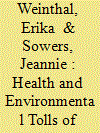|
|
|
Sort Order |
|
|
|
Items / Page
|
|
|
|
|
|
|
| Srl | Item |
| 1 |
ID:
181867


|
|
|
|
|
| Summary/Abstract |
The effects of conflict on public health and ecosystem well-being are understudied and rarely figure in public debates about war-making. Protracted conflicts are particularly damaging to people and environments in ways that are inadequately documented. In recent wars in the Middle East and North Africa, parties to the conflicts have induced hunger and displacement and undermined public health through the use of violence and economic policies that deprive civilians of access to food, water, fuel, and livelihoods. Environmental pollution is widespread, particularly in cities that became war zones, while the COVID-19 pandemic has deepened conflict-induced poverty and food insecurity.
|
|
|
|
|
|
|
|
|
|
|
|
|
|
|
|
| 2 |
ID:
156489


|
|
|
|
|
| Summary/Abstract |
“The degree to which states are tolerant of local-level initiatives and mobilization will become only more important as climate impacts intensify.” Third in a series on climate adaptation around the world.
|
|
|
|
|
|
|
|
|
|
|
|
|
|
|
|
| 3 |
ID:
191573


|
|
|
|
|
| Summary/Abstract |
Many modern conflicts, from Iraq to Yemen, have emerged as brutal wars in which state and non-state actors directly and indirectly target a wide array of civilian infrastructures, including water, energy and food systems. Similar to many twentieth-century wars, a common feature of the wars in the Middle East and North Africa in the twenty-first century has been the ‘civilianization’ of war, as civilian casualties far outnumbered battlefield deaths. We explore the targeting of civilian infrastructures in the Yemeni war (2011–2019) to explicate the connections between conflict, hunger and disease. We draw upon interviews with UN and humanitarian organizations, an original database tracking civilian infrastructure destruction, and a variety of print sources to document the extent and spatial distribution of the targeting of water, energy, agricultural and health systems in Yemen. We elucidate how the conduct of the Yemeni war has undermined human security and livelihoods and has created ethical, logistical and organizational challenges for humanitarian organizations and for advancing peacebuilding efforts. We find that after the 2011 popular uprising, some non-state actors targeted the energy sector; however, the scope and intensity of wartime targeting of civilian objects, particularly those associated with agriculture, fisheries and health, increased significantly once the Saudi-led coalition entered the war in 2015. Loss of livelihoods, internal displacement, currency depreciation, and blockades and sieges further intensified the wartime spread of hunger and disease. The targeting of civilian infrastructures significantly hinders peacebuilding efforts to restore basic services, rebuild livelihoods and strengthen governance mechanisms.
|
|
|
|
|
|
|
|
|
|
|
|
|
|
|
|
| 4 |
ID:
170057


|
|
|
|
|
|
|
|